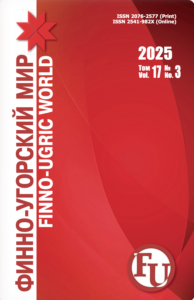The peer-reviewed academic journal “Finno-Ugric World” was founded in 2008. It seeks to develop Finno-Ugric studies, Finno-Ugric languages, literature, folk culture and arts, and the history of the native land. It welcomes the articles on the various aspects in linguistics, literature, culture, art, history and ethnography of the Finno-Ugric peoples.
The names and content of the journal’s sections correspond to the groups of specialties of academic staff in accordance with the Nomenclature of Specialties of Academic Personnel. The journal follows a double-blind peer review process to maintain its high standard of the editorial expert assessment.
The journal seeks papers and book reviews on various aspects of Finno-Ugric Studies. It covers the following research areas: “Philology” – 5.9. Philology (5.9.5. Russian language. Languages of the peoples of Russia; 5.9.6. Languages of the peoples of other countries (Finno-Ugric and Samoyedic); 5.9.8. Theoretical, applied and comparative linguistics); “History” – 5.6. Historical sciences (5.6.1. History of Russia, 5.6.2. General history, 5.6.4. Ethnology, anthropology and ethnography); “Cultural Studies” – 5.10. Cultural studies and art history (5.10.1. Theory and history of culture, art).
The founder and publisher of the journal is Federal State Budgetary Educational Institution of Higher Education “National Research Ogarev Mordovia State University” (68 Bolshevistskaya Str., Saransk 430005, Republic of Mordovia, Russia).
The journal is registered by the Federal Service For Supervision of Communications, Information Technology, and Mass Media (Certificate of Registration ПИ No. ФС-77-70644, August 3, 2017)
Print ISSN: 2076-2577
Online ISSN: 2541-982X
The journal is included in the Russian Science Citation Index (RSCI) on the Web of Science platform.
Since 2012, the journal is included in the List of Russian peer-reviewed academic journals approved by the Ministry of Education and Science of the Russian Federation to publish research results of Dissertations for the academic degrees of Doctor and Candidate of Sciences.
Editor-in-Chief: Nikolai P. Makarkin, Doctor of Economics, Professor, President of National Research Ogarev Mordovia State University, Head of the Interregional Research Center of Finno-Ugric Studies
Editorial Board:
Natalia V. Mosina, Doctor of Philology, Professor, Department of Finno-Ugric Philology, National Research Mordovia State University; section “Philology”;
Galina A. Kornishina, Doctor of Historical Sciences, Professor, Department of Russian History, National Research Mordovia State University; section “History”;
Nikolai I. Boyarkin, Doctor of Art History, Professor, Leading Researcher of the Interregional Research Center of Finno-Ugric Studies; section “Cultural Studies”.
The editorial board includes scholars, academics, representatives of State Bodies, National Public Associations, and representatives of culture and arts of the Finno-Ugric regions of the Russian Federation, Finland, Hungary and Estonia.
Editorial address:
68 Bolshevistskaya Str., Saransk
430005, Republic of Mordovia, Russia
Editorial board of “Finno-Ugric World” journal
E-mail: finno-ugric.world@mail.ru
Phone: +7 8342 481424
“Finno-Ugric World” scholarly journal is included in the Publons international reviewer platform.
The journal is indexed and archived:
Russian Science Citation Index (RISC)
European Reference Index for the Humanities and the Social Sciences (ERIH PLUS)
Scientific electronic library “CyberLeninka”
Electronic library system “Lan”
The international database of open access journals Directory of Open Access Journals (DOAJ)
Dimensions
Open Access Scholarly Publishing Association
Crossref Funder Registry
International Abstract Base of Periodicals
Ulrich’s Global Serials Directory
Electronic library system IPR BOOKS
WorldCat
Znanium
SciUp
Russian Foundation for Basic Research (RFBR)
The journal distribution: Russian Federation, and abroad.
Languages of publications: Russian, English.
To subscribe to the journal: Catalog “The Press of Russia”. Index: 42059
The Editorial Board does not provide any pay or agency services and it does not work with intermediaries.
|
Since 2024, the editorial and publishing processes of the Finno-Ugric World journal have been transferred to the RCNI platform, a mirror of the official website. There is an electronic editorial system that provides a full cycle of work with manuscripts: from submission and review to their editing and approval for publication.
All DOI identifiers lead to articles posted on this platform. The editorial board carries out systematic work on long-term archival storage, which guarantees constant access to published articles.
|






















